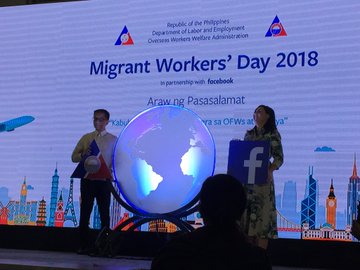OWWA-Facebook program aims to help OFWs use social media safely and for business
By RIE TAKUMI, GMA News
A new partnership between the Overseas Workers Welfare Administration (OWWA) and social media giant Facebook will seek to educate overseas Filipino workers (OFWs) on how they may build businesses and stay safe online.
The program announced on Thursday aims to improve OFWs' digital literacy before they leave the country by helping them understand basic online safety, identify scams and fake news, and improve their online empathy.
"When we used to teach digital literacy, it was just about how to use a computer," said Facebook APAC director of community affairs Clair Deevy.
"Now, digital literacy is about how do you understand all this information coming at you and what are the norms you used to have around family and what was respectful to the other people, and how do you translate this to the online world."
Filipino workers will also be involved in digital marketing workshops to help them use the social media platform to grow their small businesses.
Informational videos and modules will be made available on Facebook to allow newly-returned or active migrant workers access to these business tips.
"It's valuable to us in terms of making our OFWs and families better equipped to combat bullying, to identify fake news, and make their own value judgement or otherwise in terms of empathizing or working on any kind of information they receive through Facebook," OWWA Administrator Hans Leo Cacdac said.
"We know the inherent value of Facebook is not just a communication line but a lifeline, a line of hope and support and assurance from the government, from OWWA, that we are on their side," he continued.
Deevy said the idea to help improve the digital literacy of OFWs came from similar workshops held by FB and local non-profits with schoolchildren.
"We consistently heard feedback that students are important, but actually this large proportion of workers that were going overseas and were kind of disconnected from their friends and family, saw this as an audience that really needed this training," she explained.
Deevy later added that after five weeks of training, students would ask, "This is good, I understand it, but how do I tell my parents because I think they're doing some of the things that they shouldn't be doing?"
Practical safety
Safety basics that will be taught in the program, including distinguishing between followers and friends;, keeping information such as bank account numbers private; setting privacy options on posts to control who can see them; and distinguishing between scams and regular posts.
"Some people out there are unfortunately out to scam you, to trick you, to make money off you," Deevy said.
OFWs will also be trained in critical thinking and empathy in how they use the platform to interact with their family and friends and why they choose to share certain information with them.
"[We're] encouraging people to look at a piece of information and understand, 'Is this somebody's opinion, is this outright false,'" Deevy said.
"Even if you feel believe something to be true, or you've done it, it's bulletproof, you've got all the facts, we want to encourage people to think about if you choose to share something. Why are you choosing to share that? Are you trying to make a better place, are you trying to share information that's important, or are you trying to trick people?"
Lastly, the program will aim to teach Filipino migrant workers to spot false news by learning how to identify misleading headlines, fake URLs, and fact check through easy-to-understand infographics and lessons.
"We took this, which was developed by the Facebook head office and we worked with a Filipino designer to illustrate those tips and really make it locally relevant," Deevy said.
Growing businesses online
OWWA personnel will be trained in order to coach OFWs on how they may use Facebook and even Instagram to promote and conduct their businesses.
Among the topics include how to set up and manage a Facebook page for businesses, learn what time most customers visit the page, the page's demographics, and how to take photos of a product to induce sales.
"The training itself is broken down to little five minute training modules on here's what you can do in your first 30 days. We really evolved this thanks to partners to make this practical and as hands-on as possible," Deevy said.
Cacdac said OFWs can express interest in signing up for the offline training course before, during, and after their deployment overseas.
"We will open up all these lines for anyone who would be interested and we will try to put the participation listings all together and tap the specific OFW circles as the seminars come out," he said.
An initial target of 1,500 OFWs trained pre-departure has been set for the project's launch in July until the end of the year. Facebook and OWWA will determine the mapping of the trainees after their trial run ends.
Facebook is already working with an NGO to provide OFWs in Singapore similar training and will run a pilot program in the Philippines soon. — BM, GMA News




Comments